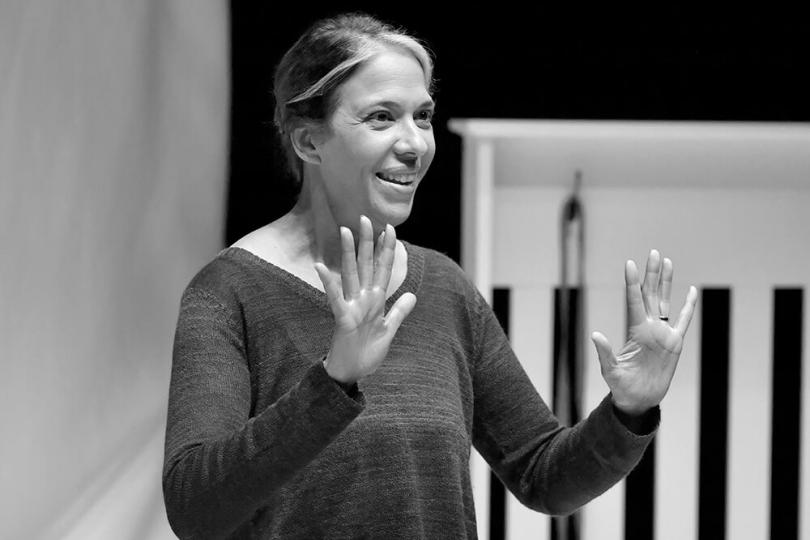Bearing Witness

When I was young and foolish I thought an artist’s greatness was measured by their complexity. By the number of flashy words they used, by the size of their orchestra, by the scarcity of their materials, by their cleverness at hiding their play’s Shakespearean roots. But I am no longer young nor foolish. The greatness of an artist can be calculated and it is measured by one thing: their understanding of the human condition.
Art is for people, not cats or robots (but let’s please talk about that another day) so to qualify art’s merit is to qualify its impact on people. People…all of whom have parents (or a lack of parents), siblings (or a lack of siblings), a home (or a lack of a home). We all have a lifetime of memories and a lifetime of emotions. Great art provokes our memories, casts new light on our experiences, makes us recognize we are either more unique or more connected to other people than we knew.
“Mala” is great art.
Written and performed by Melinda Lopez (and presented at the Guthrie Theater’s Dowling Studio), this one-woman show is a piece of perfection. In a gentle and compelling 70 minutes, the audience is told the story of a woman becoming the primary caregiver for her dying mother. In one of the most personable performances I’ve ever seen, our protagonist shares the day-to-day beauty and horror of watching a parent reach the end. We experience the minutiae of doctor’s visits and intravenous feedings, of feeling like the good child and feeling like a failure, of what you do in impossible situations. For a very quiet show, it had a very loud audience – constant vocal affirmations of ‘hmm’ or ‘yep’ along with emotional gazes and held hands between partners demonstrated a crowd that was actively engaged. Familiar family dynamics were explored with so much compassion that the evening felt a bit like group therapy, but steered clear of any ‘new age’ stereotypes by bluntly discussing impossible topics like assisted suicide and survivor’s guilt. If you try to put this play into any particular little box, it will not fit.
If young and foolish me had seen this play, he would have been disappointed. There are no confetti cannons, no marching bands, no costume changes, and no grand finale. This is an emotionally mature show relatable to anyone who has ever lost a loved one. It has no bells nor whistles but has subtly in abundance. With a cast of 1 and a creative team of 8; the set, lights, projections, sound, and general aura were perfect. They ebbed and flowed in the slightest ways that served the narrative with precision.
After the play, the audience was invited to stay in the theater for a talkback with Melinda and director David Dower. Perhaps 40 audience members remained, most of whom clearly wanted to express their gratitude to the playwright or perhaps just wanted to spend a few more minutes with her. One of the first audience “questions” was “Thank you for helping us not feel alone.” This sentiment was shared by many in the room; that speaking of death in more than five words (I’m sorry for your loss) is rarely done in our culture. This play offers a beacon to anyone who feels isolated in the experience of losing a loved one.
Prompted by the playwright’s response that one of her motivations for creating this piece was to invite discussion about our experiences with death, I raised my hand and shamelessly inserted myself into the review by asking “Has the creation of this piece given your family a way to discuss these impossible topics?” To which she pretty bluntly said… no. She gave a lovely response that this piece drove towards an emotional truth that was more stark than reality but that, even still, her family didn’t talk about death before the play and still doesn’t talk about it now. As Melinda finished her response I thought about her answer's implications… that if this play didn’t achieve its explicit goal then it’s ultimately just one woman’s optimism. That this piece is an idealized world of expression but not actually powerful enough to change family dynamics (as if anything could change family dynamics). I was satisfied and ready to write a review about an optimistic show. But then an adamant audience member refused to wait her turn and spoke without the moderator's permission – she identified herself as Melinda’s relative (aunt?) and demanded that this piece had indeed changed things in their family. That Melinda’s father-in-law saw it last year and was prompted to ask ‘what do I want to do while I’m still alive?’. Melinda confirmed that this was true and that his revelation inspired them all to take a family ‘pilgrimage’ in his final months. And dammit if that’s not great theater: the humble playwright being upstaged by the proud aunt who unknowingly states the moral of the story: ‘What do you want to do while you’re still alive?’ Melinda Lopez wants to help us feel less alone. Her aunt wants her to know it’s working.
Any piece of art that incites an audience member to shout out life lessons to a room full of strangers is cool with me. So, go see this show. And then maybe tell someone what you want to do while you’re still alive.




